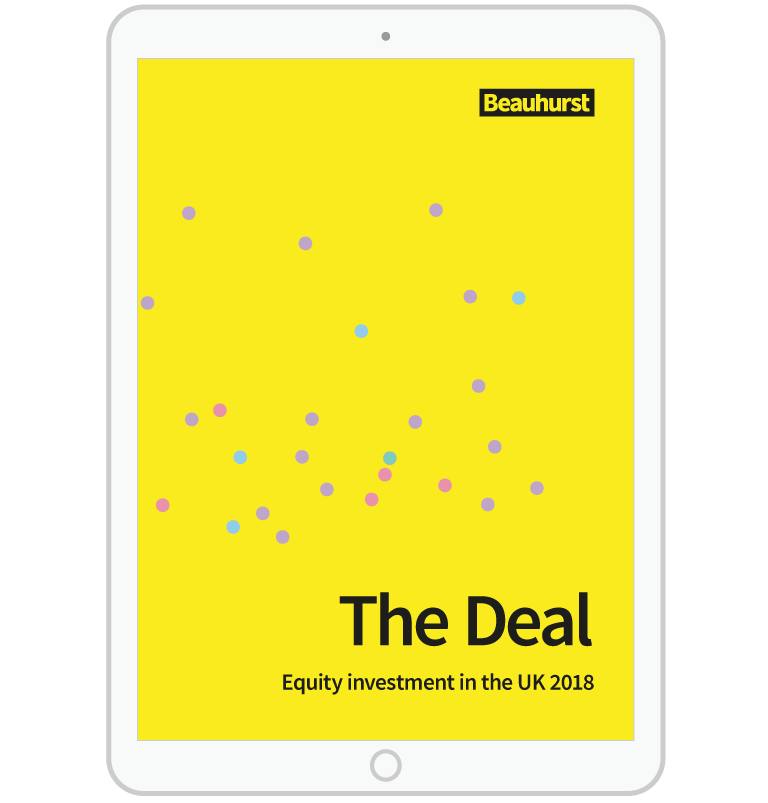Equity investment market update: Q3 2019
Category: Uncategorized
The latest data on equity investment trends in the UK. We’ve analysed every publicly-announced equity fundraising in Q3 2019, to spot emerging trends and patterns in the market.
See our yearly edition, The Deal, for in-depth analysis and features on key market trends.
Key findings
Number of deals
Amount invested
Difference from Q2 2019
Difference from q2 2019
- 2019 is now the best year of equity funding in terms of pounds invested. £9.41b has been deployed so far, breaking the £9.11b record set in 2017.
- However, deal volume is struggling to keep up. With just 368 investments announced, Q3 was the lowest quarter for deal numbers in 5 years.
- The ecosystem is maturing; Q3 saw a record average deal size of £7.68m, up from £7.09m in the previous quarter.
- Larger funding rounds are becoming increasingly common, with 26% of investments worth more than £5m – the highest proportion on record.
- Most sectors saw a decline in deals, although artificial intelligence saw a record £674m invested – almost 5x that of the previous quarter.
Investment stages
Deal numbers have declined across all stages of evolution, with a more severe decline at the earlier (seed and venture) stages. Venture deals were hit particularly hard, with a 24% drop in deal numbers from Q2. However, the amount of capital invested at this stage grew an impressive 56% from the previous quarter. No other stage of evolution saw a rise in pounds invested.
Although investment activity during 2019 as a whole is telling a fairly positive story, performance during Q3 is a little worrying. A decline in deal numbers is always a troubling sign, as it suggests investors are becoming less tolerant to risk and opting instead for a more selective portfolio. The most innovative startups need equity to fuel their growth, and these high-potential, fledgling ventures will be left in the lurch if investors choose to be more cautious with their capital.
Henry Whorwood Tweet
Investment sizes
This quarter has seen a significant shift towards larger deals. There were 11 megadeals (investments worth £50m+) made into private UK companies, just shy of the record 12 seen in Q4 2017. These make up 3.3% of all investments made during the quarter, but account for 49% of the total value invested. Just 29% of deals were worth less than £500k, down from a high of 52% in Q2 2014.
In turn, the average deal size has reached a new high of £7.68m, up from a low of £1.51m in Q2 2013.
A greater opportunity has opened up for larger, later-stage deals in recent quarters. More and more businesses have scaled to the point of requiring, and being able to take on, huge amounts of capital. They’re also allowing themselves more time to raise and deploy this equity. Just 6 high-growth companies have IPO’d in 2019 so far, compared to 15 at this time last year. With most companies taking longer to IPO, and many choosing not to go public at all, there is now ample demand for later-stage, and larger-scale, private investment.
Henry Whorwood Tweet
The biggest deals of the quarter
Leading eHealth company, babylon, secured the biggest funding round in Q3 2019, raising an impressive £454m from sovereign fund PIF and Munich Re’s ERGO Fund, along with follow-on investors Kinnevik and Vostok New Ventures. This capital injection is set to fund further research and development, as well as the company’s expansion across the US and Asia.
Cambridge based CMR Surgical achieved the second highest raise of the quarter. The £195m funding round catapulted the company to unicorn status, and will be used to commercialise its medical robotics products.
Sector focus
No sector performed particularly well in Q3 in terms of deal numbers; only edtech experienced growth in deal numbers from the previous quarter – but this was an increase of only one deal. Artificial intelligence continues to give fintech a run for its money when it comes to deal numbers, but is yet to claim the crown.
In terms of amount invested, however, artificial intelligence had an incredible quarter. Babylon’s £454m deal took the total amount invested into AI companies to £673m – that’s 4.7x more than the previous quarter, and significantly more than the amount invested into fintech companies (£295m).
Looking ahead
It remains to be seen how investment activity will adjust to any Brexit event in Q4. Investors’ risk aversion seen in this past quarter could certainly be in anticipation of a no-deal outcome. Clearly, a lot of the growth-stage companies aren’t short on capital, but we’re hoping that the entire ecosystem that supports the seed stage (earlier stage investors, angel networks and accelerator programmes) will be prepared to step up and help buoy those businesses that have solid propositions but less runway.
Henry Whorwood Tweet
Have you seen our full year report?
The Deal is our free, detailed analysis of every equity fundraising in 2018. We look at the stories behind the deals, and examine which companies, investors and sectors are making waves.





